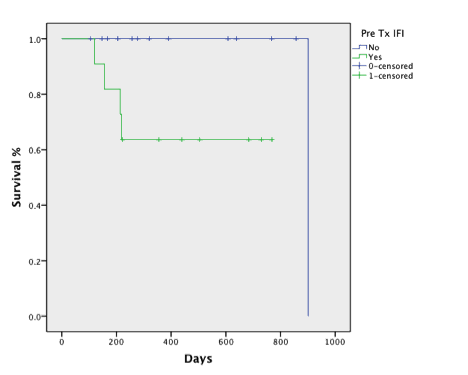Abstract
Allogeneic hematopoetic cell transplantation (allo-HCT) is currently the only curative treatment option for non-M3 AML in first or second remission (CR1, CR2). Cytogenetic risk factors, pretransplant disease status and factors apart from leukemia could affect the success of allo-SCT. It is still uncertain that allo-SCT in CR1 has superior efficacy especially for those patients who have cytogenetically standard risk. The optimization of supportive care in last 2 decades decreased early transplant related mortality substantially. In this intent-to treat, single center, retrospective study we analyzed 40 consecutive AML patients who underwent allo-SCT between January 2011 and November 2013 at our centre to determine the role of allo-SCT in CR1 or beyond. Patients were evaluated for overall survival (OS), disease free survival (DFS), early (30 - 100 day) and late (101-365 day) transplant related mortality (TRM). Survival was estimated using the Kaplan–Meier method, and the log-rank test was used to compare survival curves among variables. Median age was 48 years (19-64 y). Among those patients who had cytogenetic data (28 patient, 70%), 12 (30%) were in high-risk category. Median time from diagnosis to allo-HCT was 6.5 months (2-54 months). Median follow-up period for living patients was 419 days (105-857). Pretransplant disease status was as follows; 24 patients (60%) in CR1, 12 patients (30%) in CR2 and 4 patients (10%) had active disease. The conditioning regimens for allo-SCT consisted of myeloablative (Bu16-CY120) (n=32, 80%) or reduced-intensity regimens (Flu150-Bu8)(n=8, 20%). Donors were HLA-matched siblings for 32 patients (80%), unrelated for 7 patients (17.5%) and haploidentical for 1 patient (2.5%). All but 2 patients (95%) received peripheral blood stem cells. All patients received primary antifungal prophylaxis. Overall, TRM at day 30 and 100 were 7.5% (n=3) and 10% (n=4), respectively. Late death (>100 days) was observed in 7 patients (17.5%) and 3 of them were related to allo-SCT. Grade 2-4 aGVHD was seen in 20 (50%) patients and chronic extensive GVHD in 8 patients (20%). Of those 24 patients who underwent allo-HCT in CR1, 18 patients (75%) were still in remission without any sign of disease. Nine of 16 patients (56.3%) who underwent allo-SCT beyond CR1 lost due to relapsed leukemia. Survival analysis revealed superior OS between patients in CR1 (median 901 days) and beyond CR1 (median 202 days) (log-rank, OS p=0.003). For disease free survival we have seen the same profile (p=0.007) (Fig 1 and 2). In CR1 patients (n=24) univariate analysis revealed no impact of standard-risk cytogenetics, high HCT-CI (³2), high WBC at dx (>30k), sex (F to M), ABO mismatch and double induction for CR achievement. The only adverse factor for short OS in CR1 was past history of invasive fungal infection pre allo-SCT (p=0.038, 901d vs 553d)(Fig 1). Allogeneic HCT in AML patients should be undertaken in CR1 with matched sibling donor. Pre-tx invasive fungal infection was the only worst predictive factor for OS in CR1 AML patients cohort.
No relevant conflicts of interest to declare.
Author notes
Asterisk with author names denotes non-ASH members.


